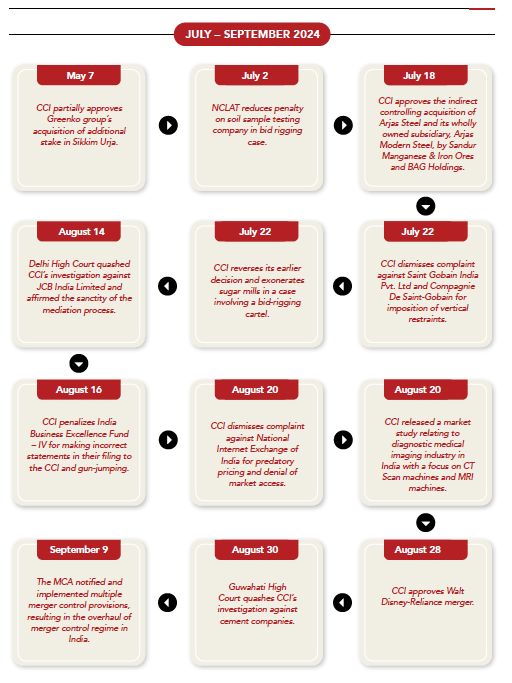- within Family and Matrimonial, Criminal Law and Environment topic(s)
- with readers working within the Utilities and Law Firm industries
INTRODUCTION
INDUSLAW presents the second edition of its quarterly competition law newsletter, 'The Sentinel'. As the name suggests, by way of this short yet extensive compilation of updates, we keep a watch for significant decisions passed by the Competition Commission of India ("CCI"), the National Company Law Appellate Tribunal ("NCLAT"), various High Courts, as well as regulatory and institutional updates which will help you navigate the competition law space with ease. Separately, for our friends who appreciate the crisp and the sweet, a ready reckoner of the noteworthy developments is set out in the flowchart below.

SUMMARY OF KEY DEVELOPMENTS IN Q2 OF FY 2024-2025
Decisions by the CCI:
In the second quarter ("Q2") of the financial year ("FY") 2024-25, the CCI declined to investigate approximately 11 (eleven) information filings relating to allegations of abuse of dominance and anti-competitive agreements. Separately, the CCI also reversed one of its initial penalty orders upon second scrutiny, once NCLAT remanded the matter back to CCI. A summary of the noteworthy cases is set out below:
CCI reverses its earlier decision and dismisses cartel allegations against Sugar Mill Association and its members1:
On July 22, 2024, the CCI, post the remand by NCLAT, reversed its earlier findings and dismissed the information against various sugar mills ("Sugar Mills") and their associations ("OPs").2
As background, in 2018, the CCI had imposed a penalty\,sup>3 ("CCI Order") on Sugar Mills and OPs for rigging bids in relation to tenders floated by the Oil Marketing Companies ("OMCs") for procurement of anhydrous alcohol ("Ethanol"). The OPs challenged the CCI Order before the NCLAT and inter alia contended that the CCI failed to provide an opportunity of hearing to the OPs after the Director General, CCI ("DG") submitted the supplementary report ("Supplementary Report") to the CCI, pursuant to the cross-examination.4 The NCLAT found merit in the OPs submissions and held that the CCI Order was not in compliance with the principles of natural justice as the CCI ought to have provided an opportunity of hearing to the OPs. Based on this, the NCLAT disposed off the appeal and remanded the matter back to the CCI.5 Pursuant to the NCLAT order, the CCI provided an opportunity of hearing to the OPs and noted that: (i) owing to similar cost of production, the likelihood of sugar mills quoting prices in the similar range was high and justifiable; (ii) mere price parallelism cannot be the sole criteria to establish a cartel and evidence of parallel pricing must be supplemented with "plus factors" showing that alleged conduct is conscious and not the result of independent business decisions; (iii) the plus factors identified, i.e., the meetings of some of the Ethanol manufacturers and exchange of a few calls between the OPs with the representative of Sugar Mills Associations, could be justified on the grounds that the meetings were held to discuss policy changes and the calls had been made to understand the nuances of the tenders floated by the OMC's (the format of which was unprecedented and therefore, a novelty); and (iv) there is not sufficient evidence to prove cartelization or bid manipulation. Thus, the CCI closed the investigation. View: The CCI has consistently held that mere price parallelism, in the absence of plus factors, is insufficient for finding of cartelisation. Further, direct contact between competitors for legitimate purpose such as discussion of government policy, and promotion and protection of their business interests (without discussion of any commercially sensitive information) doesn't raise competition law concern. CCI dismisses complaint against Saint Gobain India Pvt. Ltd. and Compagnie De Saint-Gobain for imposition of vertical restraints6:
On July 22, 2024, the CCI dismissed an information7 filed against Saint Gobain India Pvt. Ltd. and Compagnie De Saint-Gobain ("Saint Gobain") alleging: (i) imposition of vertical restraint; and (ii) abuse of dominance position. Allegedly, Saint Gobain in one of its agreements with a processor8 had: (i) imposed conditions that required processors to purchase glass exclusively from Saint Gobain; (ii) forced processors to co-brand their products with Saint Gobain; (iii) offered significant discounts to the processors/distributors that purchased exclusively from Saint Gobain, while denying products to those who engaged with Saint Gobain's competitors; and (iv) directly engaged with large customers, such as real estate companies, to negotiate prices on behalf of the processors and later compelled the processors to issue invoices reflecting these negotiated prices.
The CCI noted that the informant relied heavily on an undated and unsigned agreement, which could not establish the authenticity or binding nature of the alleged conduct and despite multiple opportunities, the informant could not provide a copy of a valid and subsisting agreement. Notwithstanding the absence of a valid agreement, based on its review of the available agreement, the CCI observed that: (i) any exclusive supply obligations were limited to specific high-performance glass products and did not extend to all glass types, allowing processors some flexibility in sourcing non high-performance glass/clear float glass products from other manufacturers; (ii) the exclusivity imposed by Saint Gobain with respect to high-performance glass products was justified as it was undertaking technical training and support for processors, to enhance product quality, thereby benefiting both parties; (iii) co-branding did not raise competition concerns, as processors could use their trademark/branding alongside Saint Gobain's under certain terms and conditions; (iv) offering differential discounts based on volume of purchase is not per se anti-competitive and the informant failed to substantiate the allegation regarding Saint Gobain's refusal to deal with processors that engaged with its competitors; and (v) the processors were free to charge the price from the end users for the value addition/enhancement they carried out in the glass received from Saint Gobain and there was no evidence to suggest that the price of the end product was being controlled by Saint Gobain since it only charged for the products it sold to the processors. Hence, no prima facie case was made out. CCI dismisses information against Employees' State Insurance Corporation for cartelisation9:
On August 9, 2024, the CCI dismissed an information10 against 5 (five) individuals and the Deputy Medical Commissioner, Employees' State Insurance Corporation ("ESIC"), alleging cartelization in the procurement of medicines by the ESIC. ESIC, a multifaceted social security scheme, procures medicines through an e-tendering process for its extensive healthcare network, which includes hospitals and clinics across India. The informant claimed that the 5 (five) individuals, officials of ESIC and 29 (twenty-nine) other drug manufacturing companies through their directors/ representatives/employees, and other departments directly/indirectly involved in the tendering process, colluded to significantly inflate prices of the medicines and healthcare products during procurement processes.
Since government bodies considered ESIC prices as a benchmark for their respective procurements, such inflation of prices resulted in huge loss of public money to the government and made it difficult for a common man to purchase medicines.
The CCI observed the absence of evidence and gave the informant 3 (three) weeks to submit specific details, including: (i) details of individuals or enterprises involved in the alleged anti-competitive conduct and the requirement to array them as opposite parties in the information; (ii) details of specific tenders where cartelization was claimed; and (iii) any other relevant information. The CCI further noted that despite multiple opportunities given to the informant to provide further details regarding specific tenders and parties involved, no substantial evidence was presented. Therefore, due to a lack of cogent evidence, the CCI dismissed the information.
To view the full article please click here.
Footnotes
1. Case No. 21, 29, 36, 47, 48 & 49 of 2013, India Glycols Ltd. v. Indian Sugar Mills Association and Ors., order dated July 22, 2024, available at: https://www.cci.gov.in/antitrust/orders/details/1122/0.
2. The CCI Order was issued based on separate informations filed by India Glycols Ltd., Ester India Chemicals Ltd., Jubilant Life Sciences Ltd., AB Sugars Ltd., Wave Distilleries and Breweries Ltd. and Lords Distillery Ltd., against (i) 3 sugar mills' associations namely Indian Sugar Mills Association, National Federation of Co-operative Sugar Factories, and Ethanol Manufacturers Association; (ii) 3 Public Sector Undertakings Oil Marketing Companies, namely Indian Oil Corporation Ltd., Bharat Petroleum Corporation Ltd., and Hindustan Petroleum Corporation Ltd.; and (iii) 14 sugar mills of the State of Uttar Pradesh.
3. Case No. 21, 29, 36, 47, 48 & 49 of 2013, India Glycols Limited Vs. Indian Sugar Mills Association & Ors., order dated September 18, 2018 available at: https://www.cci.gov.in/antitrust/orders/details/761/0.
4. Pursuant to the DG investigation, few of the OPs filed an application before CCI seeking cross-examination of a few witnesses, which was allowed by CCI and hence, the DG submitted the Supplementary Report.
5. Competition Appeal (AT) No. 103 of 2018 (along with other batch matters), Indian Sugar Mills Association v. CCI and Ors., order dated October 10, 2023.
6. Case No. 16 of 2023, XYZ Vs. Saint Gobain India Pvt. Ltd. and Anr., available at: https://www.cci.gov.in/antitrust/orders/details/1121/0.
7. The informant, the identity of whom was granted confidentiality by the CCI, is stated to be a public-spirited person.
8. The informant submitted that the services provided by glass processors included: (a) cutting and shaping; (b) tempering; (c) laminating; (d) insulating; (e) engraving and etching; (f) drilling and edging; (g) sandblasting; (h) fabrication; and (i) quality control, of glass. Further, the interrelationship between glass manufacturer and processor can be understood through various aspects such as supply of raw material by glass manufacturers, customization of the product by the glass processors through cutting, shaping, tempering, laminating, coating, or other processes to meet specific design or functional needs, value addition by glass manufacturers at the time of manufacturing and by glass processors after that, which cater to specific applications and industries, enhancing the functionality, safety, or aesthetics of the glass through various processing techniques, assurance of quality, investment, innovation and technology by the glass manufacturers and leveraging of the same by the processors and management of logistic and supply chain by the manufacturers and processors.
9. Case No. 41 of 2023, Vijay Halder Vs. Chetan and Ors, available at: https://www.cci.gov.in/antitrust/orders/details/1127/0.
10. The 5 individuals named were Mr. Ramesh, Mr. Chetan, Mr. Sandeep Gupta, Mr. Lakhwinder Singh (Nova Pharma) and Mr. Rajan Sukhija (Hospimax Health Care Pvt. Ltd.). The Informant, Mr. Vijay Halder, also alleged contravention of Section 3(3) of the Competition Act, 2002 (as amended) by the Commissioner ESIC, the Secretary, Ministry of Labour and Employment, and 29 pharmaceutical companies, but did not specifically mention them as opposite parties.
The content of this article is intended to provide a general guide to the subject matter. Specialist advice should be sought about your specific circumstances.





